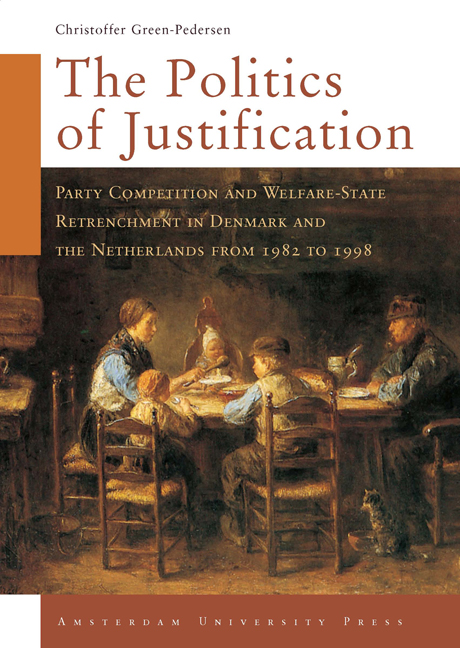 The Politics of Justification
The Politics of Justification Book contents
- Frontmatter
- Acknowledgments
- Contents
- List of Abbreviations
- 1 Introduction
- 2 From Theories of Expansion to Theories of Retrenchment
- 3 Framework for Government Choice on Retrenchment
- 4 Research Strategy and Research Design
- 5 Retrenchments in Denmark and the Netherlands
- 6 Dutch Politics and Welfare-State Retrenchment.How Party Competition Produced Consensus
- 7 Danish Politics and Welfare-State Retrenchment:The Difficulties of a Right-Wing Government and the Possibilities of a Left-Wing Government
- 8 The Evidence on Balance and some Quibbles
- 9 Party Politics Matter – Summary and Implications
- Appendix
- Summary
- Notes
- References
- Index
3 - Framework for Government Choice on Retrenchment
Published online by Cambridge University Press: 15 January 2021
- Frontmatter
- Acknowledgments
- Contents
- List of Abbreviations
- 1 Introduction
- 2 From Theories of Expansion to Theories of Retrenchment
- 3 Framework for Government Choice on Retrenchment
- 4 Research Strategy and Research Design
- 5 Retrenchments in Denmark and the Netherlands
- 6 Dutch Politics and Welfare-State Retrenchment.How Party Competition Produced Consensus
- 7 Danish Politics and Welfare-State Retrenchment:The Difficulties of a Right-Wing Government and the Possibilities of a Left-Wing Government
- 8 The Evidence on Balance and some Quibbles
- 9 Party Politics Matter – Summary and Implications
- Appendix
- Summary
- Notes
- References
- Index
Summary
This chapter aims at developing a theoretical framework to explain variation in welfare-state retrenchment, both among countries and across socialsecurity schemes. More precisely, the framework seeks to map the factors influencing government decisions on retrenchment. Theoretically, the framework draws on ideas put forward in a number of the studies referred to above and some insights developed by rational-choice theory.
Political parties: their objectives and incentives for retrenchment
As the framework is centered on political parties, it is worthwhile to start with some theoretical deliberations on them. The literature on political parties points to three different goals: office, votes, and policy (Strøm 1990a; Müller & Strøm 1999b). This framework is based on the assumption that the ultimate goal of political parties is to gain office; that is government power. However, this does not imply that they disregard votes. To gain office, any party needs votes. Consequently, in the following political parties are seen as office- and vote-seekers having office as the ultimate goal. Policy per se is not assumed to be important for political parties. Thus, the framework follows Downs (1957: 28) in arguing that, ‘parties formulate policies to win elections, rather than win elections in order to formulate policies’.
In some situations, the office- and vote-seeking strategies coincide in the sense that the best way to gain office is to gain as many votes as possible. However, in other cases, parties face a trade-off between office and votes, which in effect is a trade-off between the short- and long-run (Müller & Strøm 1999b: 9-11). How parties will respond to this trade-off in a concrete situation is difficult to predict, as it will depend on the actual situation and their time preferences (cf. Müller & Strøm 1999a). Still, as gaining office is the ultimate goal, parties are not expected to sacrifice office for votes repeatedly. In situations where vote- and office-seeking possibilities are unrelated, for instance, because a party is sure to continue in power, political parties are expected to seek as many votes as possible. The reason is that electoral success per se has a number of positive side effects such as a positive spirit within the party and an improvement of the party's bargaining position vis-à- vis other political parties.
- Type
- Chapter
- Information
- The Politics of JustificationParty Competition and Welfare-State Retrenchment in Denmark and the Netherlands from 1982 to 1998, pp. 31 - 42Publisher: Amsterdam University PressPrint publication year: 2002
